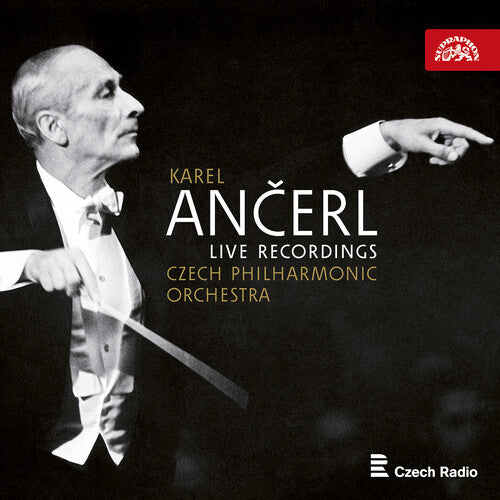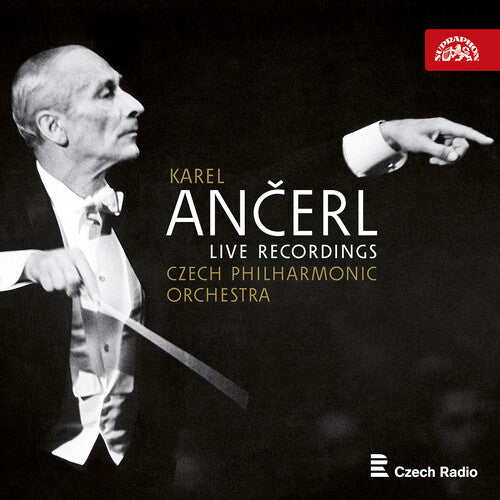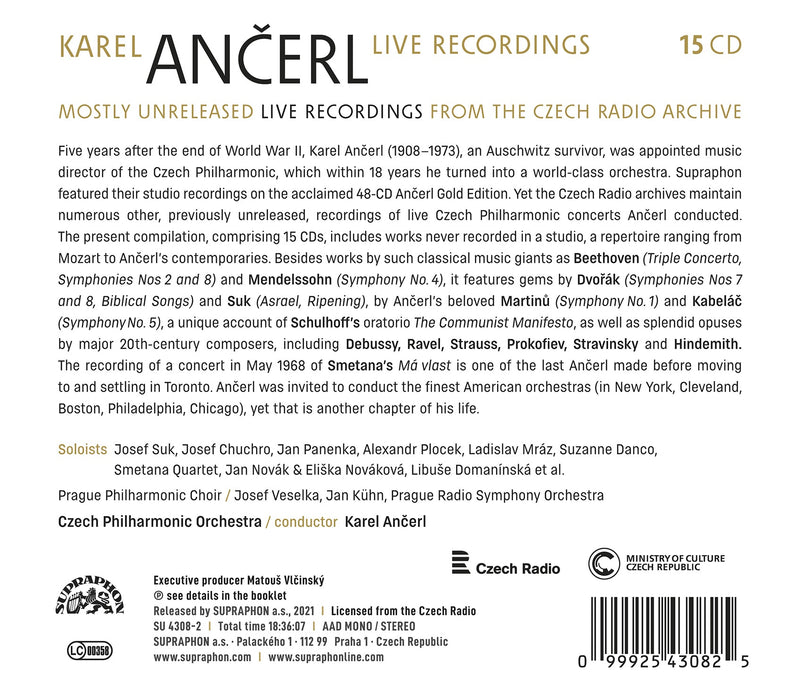Previously unreleased recordings by one of the great conductors of the 20th century.
Karel Ančerl. One of the most important conductors of post-war Europe. A man who survived the Nazi concentration camps and the avowed anti-Semitism of communist Czechoslovakia. An artist who, through enormous patience and dedication, built the Czech Philharmonic into a world-class orchestra and introduced it successfully at the most important concert halls.
From 2002 to 2008, Supraphon issued the highly acclaimed Ančerl Gold Edition with the bulk of his artistic legacy, containing nearly his complete studio recordings with the Czech Philharmonic on 48 albums. But that was far from everything. Hidden in the archive of Czech Radio, there is a wealth of concert recordings that gives us a more complete picture of this conductor. From that treasury, on 15 albums, Supraphon has selected repertoire of which studio recordings were not made; that repertoire covers a broad range from Mozart to works by Ančerl’s contemporaries.
The recordings include masterpieces by Dvořák (Symphonies Nos. 7 and 8, Biblical Songs) and Suk (Asrael, Ripening), music by composers admired and promoted by Ančerl (Martinu Symphony No. 1 and Kabelác Symphony No. 5), and major works of the worldwide 20th-century repertoire (Debussy, Ravel, Strauss, Prokofiev, etc.). The only exception of a “duplication” of a studio recording is Smetana’s Má vlast. This taping of a Prague Spring Festival concert in May 1968 was one of the last recordings Ančerl made before his definitive departure for Toronto. The concert recordings from the years 1949-1968 document the maturing of this remarkable artist perhaps even more clearly than his studio legacy.
REVIEW:
Performances appearing on CD for the first time include, most notably, Josef Suk’s epic Asrael symphony (1967), a recording that captures the full emotional range of what’s surely the greatest Czech symphony after Dvo∑ák. Most impressive is the impact of Suk’s vivid orchestration, the timpani and bass drum especially, and the way An∂erl charts the work’s dramatic sequence of events, its emotional extremes and tragic demeanor. Never before have I felt the ‘angel of death’ transform into the ‘angel of love’ at the end of the work as it does here. Even the memorable Václav Talich (also on Supraphon) doesn’t quite match up. The mono sound is exceptionally clear but Suk’s The Ripening, another fine performance, is offered in stereo, as is Smetana’s Má vlast (both 1968), where the vengeful third piece, about the fearsome amazon Šárka, is driven to paroxysms of rage.
Perhaps the most absorbing inclusion conceptually is Ervín Schulhoff’s musical setting of portions from the Communist Manifesto. Beyond his miraculous survival of Auschwitz (where his family was murdered), An∂erl joined the Communist Party of Czechoslovakia. Schulhoff had sent the only copy of his full score to the Leningrad Conservatory for safe keeping, but it was believed lost during the long siege of the city and the version that An∂erl conducts here (in 1962) is an orchestration by Svatopluk Havelka. Schulhoff had become convinced by the ideas coming out of the Soviet Union after working in Berlin in the 1920s and ’30s and was on the run from the Nazis in the later years of the 1930s, but was captured in 1941 and died in Wülzburg concentration camp in 1942 of tuberculosis. Whatever one’s political leanings (even in view of the subsequent Soviet invasion of An∂erl’s homeland, not to mention Ukraine at the present time), one can understand why he connected so deeply with fascism’s nemesis. The work itself resembles, on the one hand, the politically charged choral pieces of Prokofiev and Shostakovich, while on the other recalls the world of Mahler (try disc 15 track 6 from 7'25", where you can hear clear echoes of Mahler’s Sixth Symphony).
This is an extremely important set, very well transferred, superbly annotated (by Petr Kadlec) and sturdily presented. I can’t recommend it more highly than that.
-- Gramophone (Rob Cowan)
 {# optional: put hover video/second image here positioned absolute; inset:0 #}
Supraphon
{# optional: put hover video/second image here positioned absolute; inset:0 #}
Supraphon {# optional: put hover video/second image here positioned absolute; inset:0 #}
On SaleSupraphon
{# optional: put hover video/second image here positioned absolute; inset:0 #}
On SaleSupraphon {# optional: put hover video/second image here positioned absolute; inset:0 #}
On SaleSupraphon
{# optional: put hover video/second image here positioned absolute; inset:0 #}
On SaleSupraphon



 {# optional: put hover video/second image here positioned absolute; inset:0 #}
{# optional: put hover video/second image here positioned absolute; inset:0 #}


 {# optional: put hover video/second image here positioned absolute; inset:0 #}
{# optional: put hover video/second image here positioned absolute; inset:0 #}


 {# optional: put hover video/second image here positioned absolute; inset:0 #}
{# optional: put hover video/second image here positioned absolute; inset:0 #}